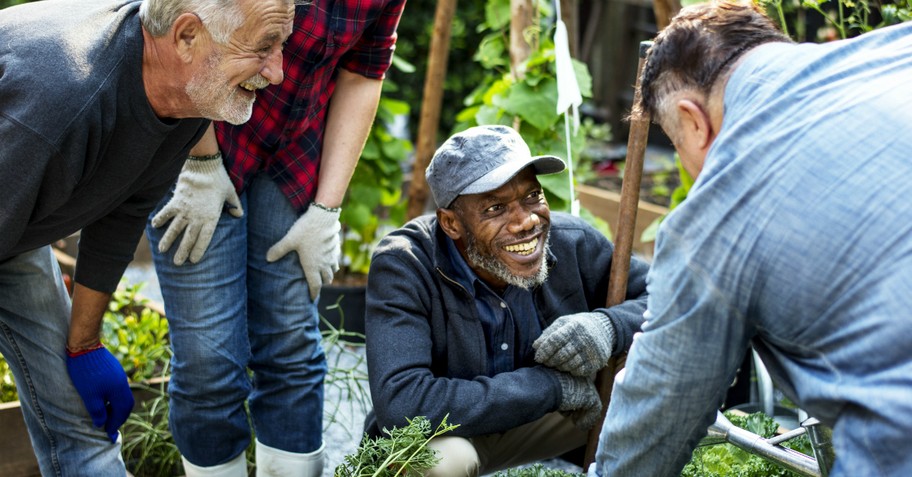Single Christians Need Intimacy Too

As we settled into our seats, my college friends and I glanced up at the screen and started to snicker. The speaker at our Christian conference was apparently going to be speaking about intimacy. To our 19-year-old minds, that meant we were getting the sex talk. But over the course of the next hour, we’d come to see that while “intimacy” has become a modern euphemism for sex, the Bible has so much more to say about the importance of non-sexual intimacy.
In his book 7 Myths about Singleness, Sam Allberry has an entire chapter devoted to intimacy for single folks. Turns out, I wasn’t too far off the mark when I started snickering – Allberry writes that “We can’t really conceive of genuine intimacy without it being ultimately sexual.”
But is that true? If intimacy means sex, and being Biblically single means practicing abstinence, then does that mean that Christian singles cannot have intimacy in their lives? When I do a quick Google search for “Christian intimacy,” every single article is about the marriage bed. Are singles doomed to a life of shallow relationships?
Absolutely not.
Photo credit: ©Getty Images/fizkes

What Is Intimacy?
“Two are better than one, because they have a good return for their labor: If either of them falls down, one can help the other up. But pity anyone who falls and has no one to help them up” (Ecclesiastes 2:9-10).
Intimacy can be found in so many relationships outside of romantic ones. It is an open, honest, even vulnerable type of relationship. A person finds intimacy with another when both are willing to be their real selves. C.S. Lewis identified four different types of love: Storge, which is affection or familiarity; Philia, which is the love of friends; Eros, which is romantic love; Agape, which an unconditional love. We see agape love when we look at the way God loves us.
Intimacy can be found in all four of these relationships, but to move from a place of familiarity to intimacy means breaking down walls, and we can do that with any sort of relationship. We can seek a deeper, truer relationship with friends, family, or your spouse. That sort of vulnerability creates a deeper bond between people. It is to be truly known and loved by another, and it is as essential for single people as it is for married couples. Allberry explains that, even in marriage, sex and intimacy are not the same. A person can have a lot of sex, but never know true intimacy. Likewise, a person can remain celibate, and have a deeply intimate relationship with someone.
The Bible has a lot to say about relationships and community. As the verse above states “pity anyone who falls and has no one to help them up.” We were made to work together, and not just in a shallow friendship or business partnership. We were meant to connect! I know this because we worship a God who is constantly in community as the Trinity.
“I and the Father are one” (John 10:30).
“Therefore go and make disciples of all nations, baptizing them in the name of the Father and of the Son and of the Holy Spirit” (Matthew 28:19).
I don’t understand how the Trinity works, but I do know that it is three separate entities – God the Father, God the Son, and God the Holy Spirit. All three are in constant community with each other, always on the same wavelength, if you will. And Genesis reminds us that God made humankind “in our own image” (Genesis 1:26). We were made to copy God – and that includes living in community!
Related Resource: Listen to our podcast, Single Mom 101! You can find all our episodes at LifeAudio.com. Here's Episode 1:
Photo credit: ©Getty Images/Lorenzo Antonucc

2 Obstacles to Intimacy
There seems to be two major obstacles to these close, intimate relationships nowadays. The fear of vulnerability, and a hyper-fixation on sexuality.
Almost everyone, it seems, is afraid of vulnerability. We build up a perfect, Instagram-able image of ourselves to show people, and we worry that they will see past this veneer to the messy human underneath. We worry, deep down, that the real us is unlovable. So we cover it up.
The beauty of the Gospel is to remind us that we are never unlovable. God sent His Son to rescue us even when we were at our most messy. Indeed, even while Jesus was dying on the cross, He prayed that the Father would forgive the ones crucifying Him (Luke 23:24). He cares for us. He cares for you. And that means we don’t have to put up a good image to come before Christ, or to have a deep, intimate relationship with Him.
It can feel like a big ask, to love our friends and family the way Jesus loves us. But we are called to live in community and rely on each other. It won’t be perfect, but it’s certainly worth the risk to seek out deeper, truer relationships with others.
The second obstacle is a modern fixation on romantic love. We’ve reached a point where friendships, and even family, are pushed aside in favor of romantic relationships. And in a culture that teaches any love is good, it’s easy for us to mistake intimate friendships with romantic ones.
In J.R.R Tolkien’s The Lord of the Rings, the two main characters, Frodo and Sam, have a very deep, intimate relationship. These characters were likely influenced by the bonds that Tolkien himself formed with his fellow soldiers in World War I. Like those soldiers, Frodo and Sam face terrifying situations together, they rely on each other to stay alive, and they accomplish the impossible. Traveling “there and back again,” would build a deep, unbreakable relationship in anyone.
But Frodo and Sam are also physically affectionate. They hold hands and hug – they care for each other. To many modern readers, that, paired with the deep regard they have for each other, means they must be gay. After all, how could two straight characters care for each other this deeply, and not drift into romantic love?
We see a similar argument with the Biblical story of David and Jonathan:
“So Jonathan made a covenant with the house of David, saying, ‘May the LORD call David’s enemies to account.’ And Jonathan had David reaffirm his oath out of love for him, because he loved him as he loved himself” (1 Samuel 20:16-17).
“I grieve for you, Jonathan my brother; you were very dear to me. Your love for me was wonderful, more wonderful than that of women” (2 Samuel 1:26).
These verses, rather than prove David and Jonathan were in a sinful relationship, shows us a powerful image of Biblical friendship. It is meant to be encouraging for us, especially single folks, that the lack of a romantic relationship does not mean we will never know, or be known, by a true, intimate friend.
Real relationships do not have to be romantic. The lack of a romantic, eros love does not mean that you can never know true intimacy. To insist that it is so hurts those other important relationships, and keeps us focused on just seeking romance. But God intended for us to connect on many more levels than just romantic. After all, Paul said that he wished everyone could remain single (not involved in a romantic relationship) like him (1 Corinth. 7:7). And Paul was certainly not without deep friendships in his life (see all of 1 and 2 Timothy).
Photo credit: ©Getty Images/metamorworks

Why Is This Important for Single People (and Everyone)?
Friendship has become such a boring word in our modern society. We “friend” someone when we add them on social media. We have online friends whom we’ve never met before. We even say someone has been “friendzoned” when they are denied a romantic relationship.
But friendship is essential for healthy humans. For one thing, it’s an entirely voluntary relationship. You are born into a family, whether you like them or not. But you choose your friends – and they choose you. These chosen relationships, if they are grown and nurtured into an intimate friendship, are beneficial in many ways.
This article from Medium quotes a research study that found “quality friendships are a key ingredient to not just your happiness but also your physical and mental health, sometimes even more so than your family.” We all know it’s nice to have friends, but it can be detrimental not to.
But beyond having a friend who you just catch up with once a month, or call to talk about surface level things, an intimate friend knows everything about you. These relationships are powerful because the person sees, not an Instagram-ready version of you, but the real, messy, sometimes hard-to-love you. And they love you anyway. Allberry writes that these friends are “the ones who really know what’s going on with you. They know your temptations, and they know what most delights your heart. They know how to pray for you instinctively. This is true intimacy.”
This kind of love, whether through friendship, marriage or family, reflects the unconditional love of God. David writes “How priceless is your unfailing love, O God!” (Psalm 36:7). A God who knows our hearts, who knows our temptations and desires and joys, who sees us on our worst days and loves us anyway, is stupendous. And it reminds us “Dear friends, let us love one another, for love comes from God” (1 John 4:7).
Photo credit: ©Getty Images/Rawpixel

Single People, Embrace Intimacy!
Have you ever struggled with “friend-dating”? Up until graduation, we are all surrounded by people who are very similar to us. Our classmates are all around our age, have similar experience from going to the same school, and probably live close to us too. It’s easy to build friendships. That gets harder when we leave school and try to make adult friends.
Queue “friend-dating.” It seems that making friends has never been so stressful – it feels like a date! How do I ask this person to hang out? Should I text them or call? Should we hang out in a group, or is it cool if the two of us just grab coffee? Do you think she really likes me, or does she think I’m weird?
I know it’s tough out there to make new friends. And pursuing this kind of deep, real relationship will take time and effort from both parties. But if you can find that person to connect with and grow with, the benefits will far outweigh the effort. Having someone to rely on, to lift you up when you need it, is so important for us as humans, but especially for us as believers. Having a friend to pray for you and encourage you, to keep you accountable and offer Biblical guidance when you slip, is invaluable. It helps you grow in your faith, both to receive this type of love and to learn to give it yourself.
Don’t wait until marriage for intimacy. Nurture those friendships, be real with each other, and grow closer to Christ through a sacrificial, loving friendship.
More from this author
Why It's Important to Seek Out Non-Christian Friends Too
Investigating Your Unique Spiritual Gifts
8 Encouraging Verses to Guide You Through Life
Photo credit: Unsplash/Roberto Nickson
Originally published June 04, 2021.





